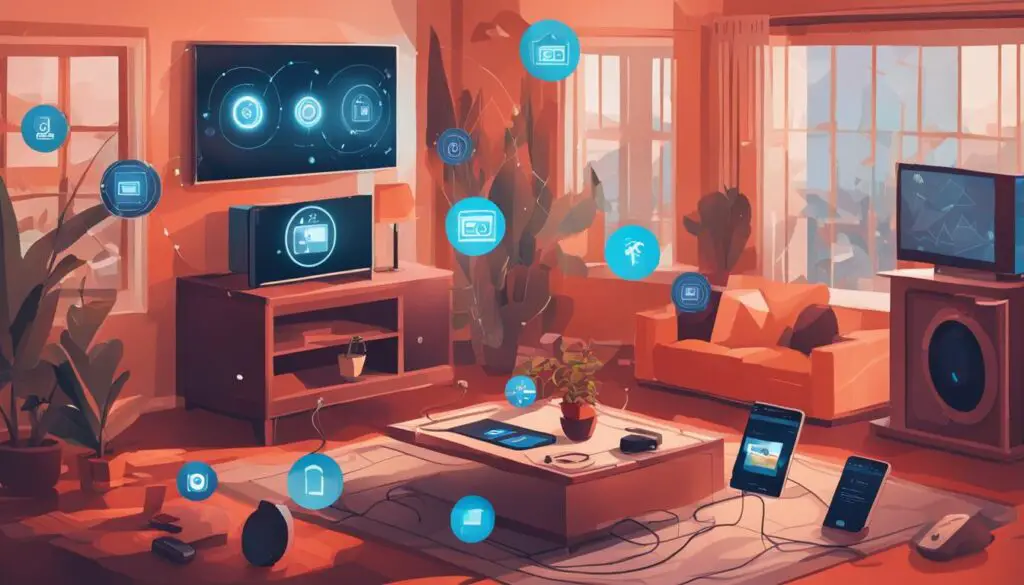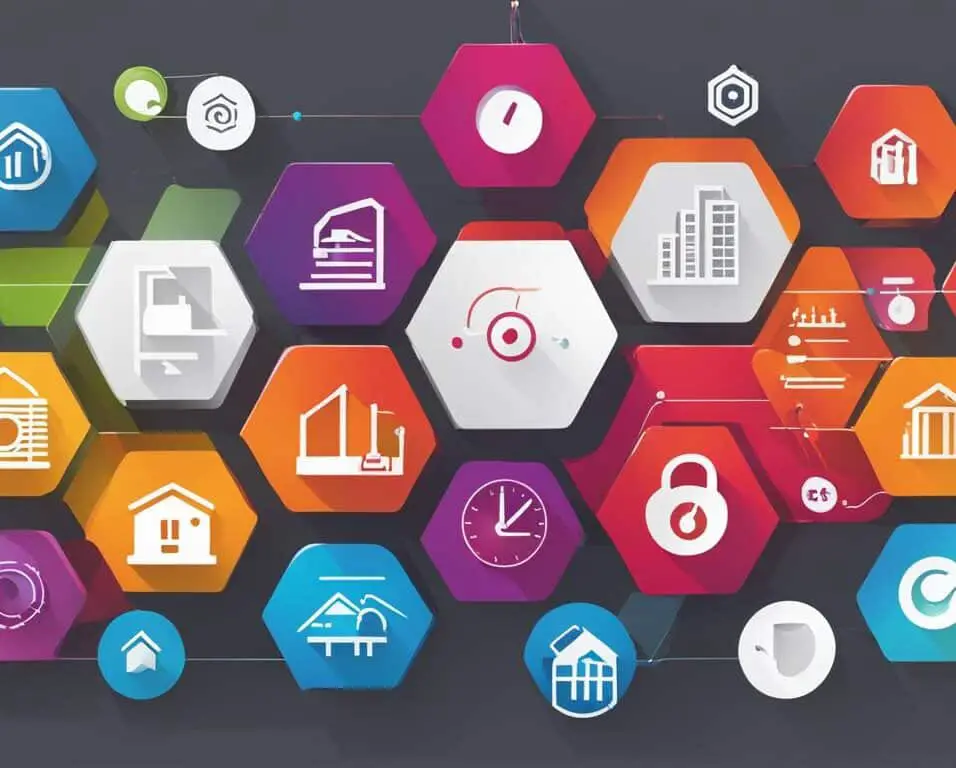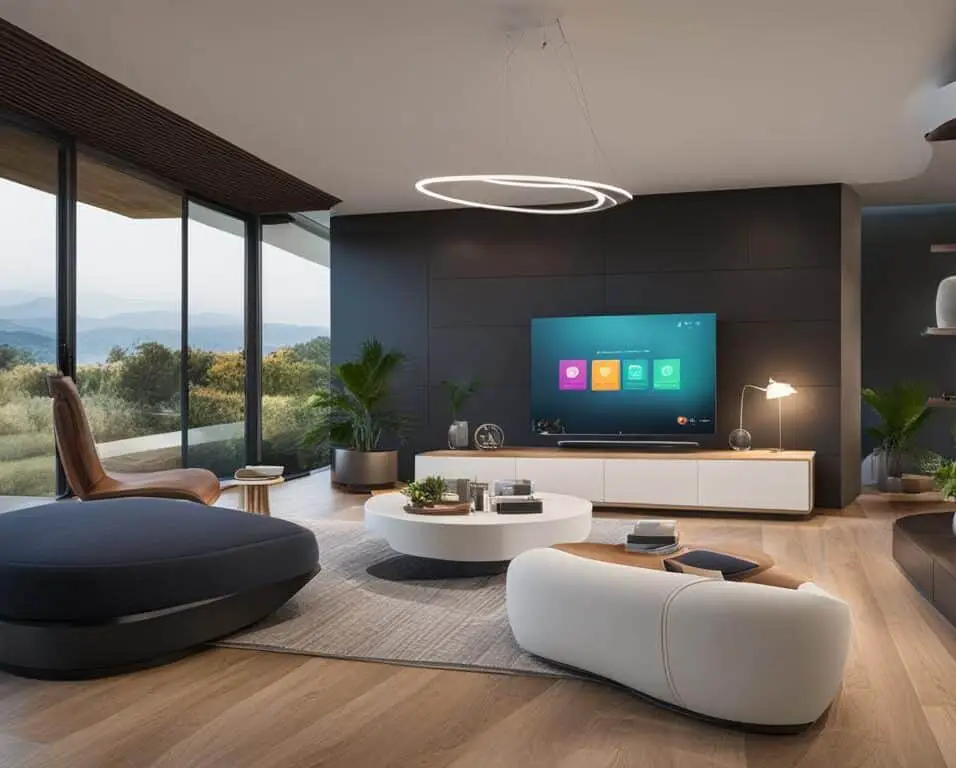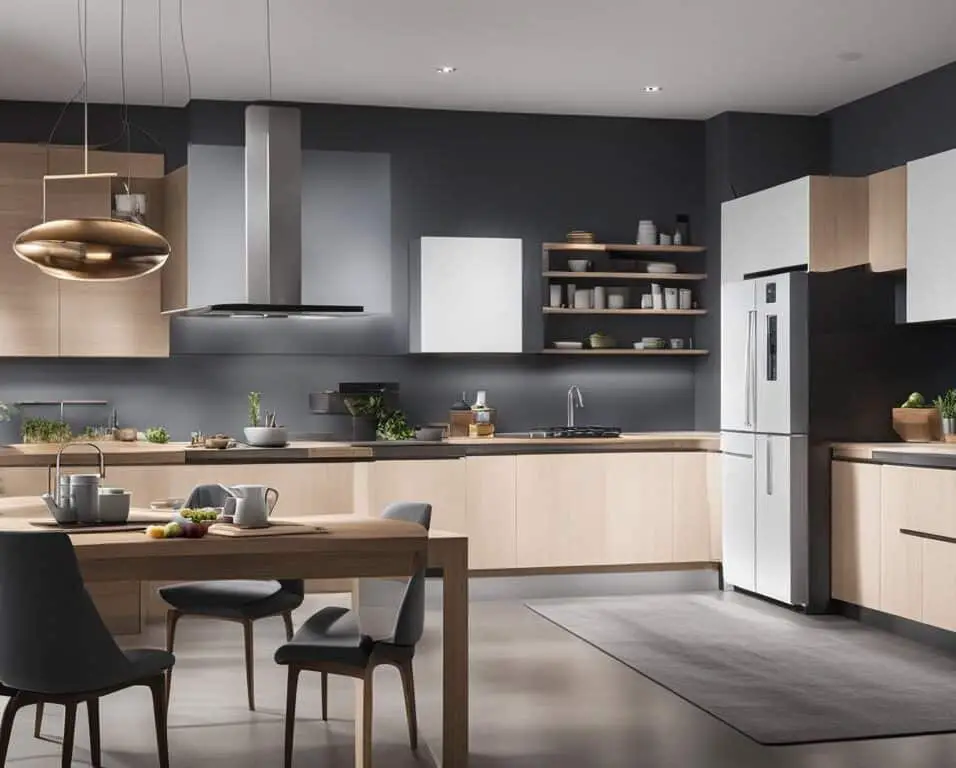IoT Innovations for Enhanced Smart Homes
In today’s digital age, the Internet of Things (IoT) has become an integral part of our lives. From smart speakers that play our favorite tunes to voice-activated thermostats that ensure optimal comfort, IoT innovations have transformed the way we interact with our homes. In this article, we will explore the benefits of integrating IoT devices in smart homes and how they contribute to efficient and connected living spaces.
Smart homes are residences that are equipped with IoT devices and systems, enabling homeowners to automate and control various aspects of their living environment. By seamlessly connecting devices and sensors, IoT technology creates an interconnected ecosystem within the home, facilitating enhanced comfort, security, energy efficiency, and convenience.
Integrating IoT devices in smart homes revolutionizes the way we live. With a simple voice command or a tap on our smartphones, we can control lights, thermostats, and appliances from anywhere, at any time. We can even schedule tasks to be performed automatically, ensuring that our homes are always energy-efficient and comfortable.
Security is another key area where IoT plays a vital role in smart homes. Smart doorbells, cameras, and motion sensors enable us to monitor and secure our homes remotely. We receive real-time notifications and can even interact with visitors through our smartphones, enhancing both convenience and security.
When it comes to entertainment, IoT devices offer integrated systems that provide immersive experiences. Whether it’s streaming music throughout the house or controlling our home theater setups, IoT technology enhances our entertainment options and ensures that we can enjoy our favorite content with ease.
IoT’s impact on health and well-being is also significant. With health monitoring devices and sensors, we can keep track of our vital signs, sleep patterns, and even receive reminders for medication. Smart homes enable us to create personalized environments that promote our well-being and help us lead healthier lives.
Additionally, IoT devices contribute to home maintenance by continuously monitoring the condition of various systems and appliances. They can alert us to potential issues before they escalate, allowing us to take proactive measures and avoid costly repairs or replacements.
The convenience of voice assistants, such as Amazon Echo and Google Home, further enhances the functionality of IoT devices in smart homes. With a simple voice command, we can control our entire ecosystem of connected devices, creating a seamless and intuitive living experience.
The benefits of integrating IoT devices in smart homes extend beyond convenience. They also enhance safety, accessibility, and energy efficiency. Features like smart locks and security cameras improve the security of our homes, while advancements in IoT technology enable us to create accessible living environments for individuals with disabilities. Furthermore, IoT devices promote energy efficiency by optimizing the usage of lighting systems, thermostats, and appliances, resulting in reduced energy consumption and lower utility bills.
Key Takeaways:
- Integrating IoT devices in smart homes enhances comfort, security, energy efficiency, and convenience.
- IoT technology connects various devices and sensors, creating an interconnected ecosystem within the home.
- Smart homes offer automation of tasks, remote monitoring and control, and personalized living environments.
- IoT devices in smart homes contribute to improved security, entertainment, health monitoring, and home maintenance.
- Voice assistants like Amazon Echo and Google Home enable intuitive control over IoT devices in smart homes.
Key Applications of IoT in Smart Homes
IoT devices in smart homes provide numerous applications that enhance the convenience, security, energy efficiency, entertainment, health and well-being, and maintenance of the home. By integrating IoT technology, homeowners can transform their houses into intelligent living spaces.
Home Automation: IoT enables automation of various tasks in smart homes, allowing homeowners to control lights, thermostats, and appliances remotely or on a schedule. This automation feature brings convenience and efficiency to daily routines.
Security and Surveillance: With IoT, smart homes have revolutionized home security. Smart doorbells, cameras, and motion sensors provide advanced security measures, allowing homeowners to monitor their homes remotely and receive real-time alerts in case of suspicious activities.
Energy Efficiency: Smart homes promote energy efficiency through IoT devices. Smart thermostats, lighting systems, and appliances are equipped with sensors that optimize energy consumption based on usage patterns and external factors. This leads to significant energy savings and a reduced carbon footprint.
Entertainment: IoT in smart homes offers integrated entertainment systems that allow homeowners to control audio and video devices through a central hub or their mobile devices. This enables seamless streaming, music playback, and personalized entertainment experiences.
Health and Well-being: IoT devices cater to the health and well-being of occupants in smart homes. Health monitoring devices, such as fitness trackers and sleep monitors, provide real-time data that can be used to improve overall well-being. Smart appliances can also support a healthy lifestyle by providing nutritional information and personalized meal planning.
Home Maintenance: IoT sensors in smart homes can monitor the condition of home systems and appliances, providing early warnings for maintenance issues. This proactive approach helps homeowners address potential problems before they escalate, saving time and money on repairs.
Home Appliances: IoT technology enhances the functionality of home appliances. Smart refrigerators, washing machines, and ovens can be controlled remotely, provide status updates, and offer personalized settings. This streamlines household tasks and improves overall efficiency.
Voice Assistants: Voice assistants like Amazon Echo and Google Home serve as central controllers for various IoT devices in smart homes. Homeowners can use voice commands to control lights, adjust temperatures, play music, and perform other tasks, making home automation even more convenient.
By harnessing the power of IoT, smart homes are elevating the way we live, making our lives more comfortable, secure, energy-efficient, and enjoyable.
The Future of IoT in Smart Homes
In the future, IoT technology will continue to advance and offer even more innovative solutions for smart homes. Artificial intelligence will enable intelligent automation, allowing homes to anticipate occupants’ needs and adjust settings accordingly. Enhanced security systems, increased interconnectivity between devices, and integration with smart city initiatives will further transform the way we interact with our homes. Sustainability features will play a significant role in smart homes of the future, with IoT devices and systems promoting energy conservation and eco-friendly practices.
Benefits of IoT in Smart Homes
The integration of IoT in smart homes offers a multitude of benefits that enhance convenience, security, energy efficiency, personalization, safety, and accessibility. Let’s explore how IoT transforms everyday living.
Convenience
Smart homes make daily tasks more convenient by automating various functions. With IoT devices, you can control lights, thermostats, and appliances remotely or set them on a schedule. Imagine arriving home to a well-lit, comfortable environment without having to lift a finger.
Enhanced Security
The advanced security features of smart homes provide peace of mind. IoT devices, such as smart doorbells, cameras, and motion sensors, allow for real-time monitoring and alerts, keeping you informed of any suspicious activities. You can monitor and control your home’s security from anywhere, ensuring the safety of your loved ones and belongings.
Energy Efficiency
Smart homes contribute to a more sustainable future by promoting energy-efficient practices. IoT devices like thermostats, lighting systems, and appliances can be optimized to reduce unnecessary energy consumption. By monitoring energy usage and adjusting settings accordingly, you can lower your carbon footprint and save on utility bills.
Personalization
IoT technology enables personalized living environments tailored to your preferences. Smart homes learn your habits and adapt to your needs, creating a more comfortable and intuitive space. Whether it’s adjusting the thermostat to your preferred temperature or setting the lighting ambiance to match your mood, smart homes enhance your everyday experience.
Safety
Smart homes prioritize safety through smart features like locks and security cameras. With smart locks, you can remotely control access to your home and receive alerts when someone enters or exits. Security cameras provide 24/7 surveillance, deterring potential intruders and providing valuable evidence in case of incidents.
Accessibility
IoT in smart homes promotes accessibility by enabling individuals with disabilities to live more independently. Voice-activated assistants and IoT devices with intuitive interfaces allow for easy control and management of various household functions. Smart homes empower everyone to enjoy the benefits of technology, regardless of physical limitations.
By embracing IoT technology in smart homes, you can enjoy the unparalleled convenience, enhanced security, energy efficiency, personalization, safety, and accessibility it offers.
| Benefits of IoT in Smart Homes |
|---|
| Convenience |
| Enhanced Security |
| Energy Efficiency |
| Personalization |
| Safety |
| Accessibility |
Challenges and Considerations
While IoT in smart homes offers numerous benefits, it also presents several challenges that need to be addressed for successful implementation. These challenges include:
- Data Security and Privacy Concerns: The interconnected nature of IoT devices raises concerns about the security and privacy of personal data. Safeguarding sensitive information is crucial to prevent unauthorized access and potential breaches.
- Interoperability Issues: With a multitude of IoT devices available in the market, ensuring seamless communication and compatibility between different devices can be challenging. Interoperability issues may hinder the integration and effectiveness of smart home systems.
- Reliability Concerns: The reliability of IoT devices and connectivity is essential for uninterrupted operation. Concerns regarding device malfunctions or network outages need to be addressed to ensure the consistent functionality of smart home systems.
- High Initial Implementation Costs: The cost of implementing an IoT infrastructure in a smart home can be substantial. Homeowners need to consider the expenses associated with purchasing compatible devices, installation, and network setup.
- Workforce Training: The successful implementation and maintenance of IoT in smart homes require specialized knowledge and skills. Homeowners may need to invest in workforce training or seek professional assistance to maximize the benefits of IoT technology.
Effective management of these challenges is crucial for the widespread adoption and success of IoT in smart homes. Addressing data security, ensuring interoperability, improving reliability, managing implementation costs, and investing in workforce training are essential steps for harnessing the full potential of this technology.
Table: Challenges of IoT in Smart Homes
| Challenges | Description |
|---|---|
| Data Security and Privacy Concerns | Risks associated with unauthorized access and breaches of personal data in interconnected smart home systems. |
| Interoperability Issues | Difficulties in ensuring seamless communication and compatibility among different IoT devices. |
| Reliability Concerns | Potential disruptions in device functionality or connectivity affecting the performance of smart home systems. |
| High Initial Implementation Costs | The significant expenses involved in purchasing compatible devices, installation, and network setup. |
| Workforce Training | The need for specialized knowledge and skills to effectively implement and maintain IoT technology in smart homes. |

The Future of IoT in Smart Homes
The future of IoT in smart homes is poised to revolutionize the way we live, offering a wide array of advancements that will enhance our daily lives. With the rapid progress of artificial intelligence (AI), enhanced security systems, increased interconnectivity, sustainability features, and integration with smart cities, the possibilities for smart home technology are endless.
Advancements in Artificial Intelligence
Artificial intelligence plays a crucial role in shaping the future of IoT in smart homes. With AI-powered devices and systems, homes will become even more intelligent and capable of automating routine tasks. Imagine a home that adjusts the temperature, lighting, and music preferences based on your habits and preferences, creating a personalized and comfortable environment for you and your family.
Enhanced Security Systems
Security is a top priority for homeowners, and the future of IoT in smart homes will bring enhanced security systems to the forefront. Smart homes will be equipped with advanced surveillance cameras, motion sensors, and facial recognition technology to provide a safer living environment. These systems will not only deter potential intruders but also send real-time alerts to homeowners, allowing them to take immediate action in case of emergencies.
Increased Interconnectivity
In the future, IoT devices in smart homes will seamlessly connect with each other, creating a truly interconnected ecosystem. This means that your smart thermostat can communicate with your smart refrigerator to automatically adjust the temperature based on the contents of your fridge. Interconnectivity will streamline daily tasks and improve overall efficiency, making smart homes even more convenient and user-friendly.
Sustainability Features
As sustainability becomes increasingly important, the future of IoT in smart homes will focus on energy-efficient and eco-friendly solutions. Smart homes will incorporate energy monitoring systems to track energy consumption and optimize usage. Additionally, IoT devices will enable homeowners to remotely control and manage their appliances, reducing wasted energy and lowering utility bills. The integration of renewable energy sources, such as solar panels, will further contribute to a sustainable future.
Integration with Smart Cities
The future of IoT in smart homes goes beyond individual residences. These smart homes will be integrated with smart city initiatives, forming a cohesive network of interconnected devices and systems. This integration will enable seamless communication between smart homes, transportation systems, and urban infrastructure, resulting in improved efficiency, reduced congestion, and enhanced quality of life for residents.
In the future, smart homes will not only provide us with convenience but also contribute to a more sustainable and interconnected world. The possibilities that lie ahead are immense, and we are only scratching the surface of what IoT technology can achieve in the realm of smart homes.

As we move forward, it is essential to embrace these advancements and harness the full potential of IoT in smart homes. By integrating artificial intelligence, enhancing security systems, promoting interconnectivity, prioritizing sustainability, and integrating with smart cities, we can enhance our living spaces and create a brighter future for all.
Introduction to Smart Homes and the Internet of Things (IoT)
Welcome to the world of smart homes, where the Internet of Things (IoT) transforms ordinary houses into connected and intelligent living spaces. Today, smart homes are equipped with a wide range of connected devices and appliances that offer unprecedented convenience, control, and monitoring capabilities, all at your fingertips.
With the power of IoT, smart homes enable the seamless exchange of data between these interconnected devices and systems. This interconnectedness not only enhances our daily lives but also revolutionizes the way we interact with our living spaces.
Imagine being able to control your lighting, thermostat, security system, and even your appliances without even being at home. With smart homes and the IoT, this level of control and convenience is no longer a futuristic dream—it’s a reality.
Through remote control capabilities, you have the power to adjust settings, monitor energy usage, and even receive real-time notifications about the status of your home. Whether it’s dimming the lights, adjusting the temperature, or checking if you locked the front door, smart homes make it all possible with just a few taps on your smartphone or voice commands to your virtual assistant.
Smart homes also provide enhanced monitoring capabilities, ensuring that you have peace of mind even while you’re away. With connected security systems, surveillance cameras, and motion sensors, you can keep a watchful eye on your property at all times, receiving instant alerts if any unusual activity is detected.
But convenience and control are just the beginning. The Internet of Things has the potential to transform every aspect of our homes, from energy efficiency to entertainment, health and well-being to home maintenance.
Imagine walking into a room, and the temperature automatically adjusts to your preferred setting. Or having your favorite music play throughout the house as you move from one room to another. With IoT in smart homes, these personalized experiences are within reach.
As we continue on our journey exploring the world of smart homes and the Internet of Things, we’ll delve deeper into the benefits, challenges, and future possibilities of this exciting technology. So stay tuned as we uncover the endless opportunities that smart homes and the IoT bring to our lives.
Benefits and Advantages of Smart Homes
Smart homes offer a multitude of benefits that enhance our daily lives. From increased convenience to improved well-being, the advantages of embracing smart home technology are undeniable.
Convenience
One of the primary benefits of smart homes is the unparalleled level of convenience they provide. With just a few taps on a smartphone or a voice command to a smart assistant, you can control various aspects of your home. Whether it’s adjusting the temperature, turning on the lights, or even starting your coffee maker, smart homes make daily tasks easier and more streamlined. This level of control at your fingertips saves time and energy, allowing you to focus on the things that truly matter.
Energy Savings
Smart homes are also designed to be energy-efficient. With the integration of smart thermostats, lighting systems, and appliances, you can actively reduce your energy consumption and contribute to a more sustainable future. These devices can be programmed and controlled remotely, enabling you to optimize energy usage based on your needs and preferences. By adopting smart home solutions, you not only save on energy bills but also play a part in protecting the environment.
Enhanced Safety
When it comes to ensuring the safety of your loved ones and your property, smart homes excel. The advanced security features offered by smart home technology provide peace of mind and protect against potential risks. From smart locks and video doorbells to motion sensors and surveillance cameras, smart homes offer robust security systems that can be monitored and controlled remotely. With real-time notifications and alerts, you can stay informed about any potential threats, making your home a safer place for everyone.
Improved Well-Being
Smart homes have the potential to improve your overall well-being by promoting healthier lifestyles. With smart health monitoring devices, you can track vital signs, sleep patterns, and activity levels, allowing for proactive health management. Smart home technology also enables integration with home fitness equipment, creating a seamless experience for your health and wellness goals. By prioritizing well-being through smart home solutions, you can take control of your health and lead a more balanced and fulfilling life.
| Benefits | Description |
|---|---|
| Convenience | Smart homes offer unparalleled convenience with easy control of various aspects of your home. |
| Energy Savings | Smart homes are designed to be energy-efficient, optimizing energy consumption and reducing utility bills. |
| Enhanced Safety | Advanced security features in smart homes provide robust protection and real-time monitoring. |
| Improved Well-Being | Smart home technology promotes healthier lifestyles through health monitoring and seamless integration with fitness equipment. |
Embracing the benefits and advantages of smart homes allows you to optimize your living space, harness the power of technology, and enrich your daily life. Experience the transformation that smart home technology brings, and unlock a future of convenience, energy savings, enhanced safety, and improved well-being.
Conclusion
The smart home revolution powered by the Internet of Things (IoT) is transforming the way we live, enhancing our quality of life, and embracing the future of technology. With IoT devices and systems seamlessly integrated into our homes, we can enjoy unprecedented convenience, energy savings, enhanced security, and an overall improved living experience.
By embracing the smart home revolution, homeowners can optimize their living spaces and effortlessly control various aspects of their homes. With just a few taps on a smartphone or the sound of their voice, they can adjust the temperature, turn on/off lights, and even start kitchen appliances remotely. This level of convenience not only saves time but also adds an extra layer of comfort to our daily routines.
Furthermore, smart homes offer significant energy savings by intelligently managing and optimizing energy consumption. From smart thermostats that learn our preferences and adjust temperature settings accordingly to smart lighting systems that automatically turn off when not in use, these energy-efficient solutions not only reduce our carbon footprint but also result in cost savings on utility bills.
Enhanced security is another major benefit of smart homes. With IoT-enabled security systems, homeowners can remotely monitor their homes through high-definition cameras, receive real-time alerts for suspicious activities, and control access through smart locks. This advanced level of security provides peace of mind and ensures the safety of our loved ones and valuable belongings.
As we move forward, it is clear that the smart home revolution is here to stay. By embracing IoT technology in our homes, we are not only embracing the future but also unlocking a world of possibilities that will continue to enhance our lives. With the convenience, energy savings, enhanced security, and improved quality of life that smart homes offer, it’s time for homeowners to embrace this transformative revolution and experience the full potential of the interconnected world.
FAQ
What are some key applications of IoT in smart homes?
IoT technology in smart homes enables home automation, security and surveillance, energy efficiency, entertainment, health and well-being, home maintenance, control of home appliances, and integration with voice assistants.
What are the benefits of integrating IoT in smart homes?
Integrating IoT in smart homes offers benefits such as convenience, enhanced security, energy efficiency, personalized living environments, safety features, and improved accessibility for individuals with disabilities.
What are the challenges and considerations of using IoT in smart homes?
Some challenges of using IoT in smart homes include data security and privacy concerns, interoperability issues, reliability concerns, high initial implementation costs, and the need for workforce training.
What does the future hold for IoT in smart homes?
The future of IoT in smart homes includes advancements in artificial intelligence for intelligent automation, enhanced security systems, increased interconnectivity, sustainability features, and integration with smart city initiatives.
What is the Internet of Things (IoT) in relation to smart homes?
The Internet of Things (IoT) enables the exchange of data between connected devices and appliances in smart homes, allowing for remote control and monitoring, enhancing convenience and control.
What are the benefits and advantages of smart homes?
Smart homes offer benefits such as increased convenience, energy savings, enhanced safety with advanced security features, and improved well-being through a healthier living environment.
How does embracing the smart home revolution impact daily life?
Embracing the smart home revolution improves quality of life by providing convenience, energy savings, enhanced security features, and personalized living environments.
Source Links
- https://iotbusinessnews.com/2023/11/10/89810-the-smart-home-revolution-how-iot-is-transforming-modern-living/
- https://www.toptal.com/designers/interactive/smart-home-domestic-internet-of-things
- https://medium.com/@alexandragrosu03/the-rise-of-smart-homes-exploring-the-internet-of-things-iot-b980fe3b78a1








